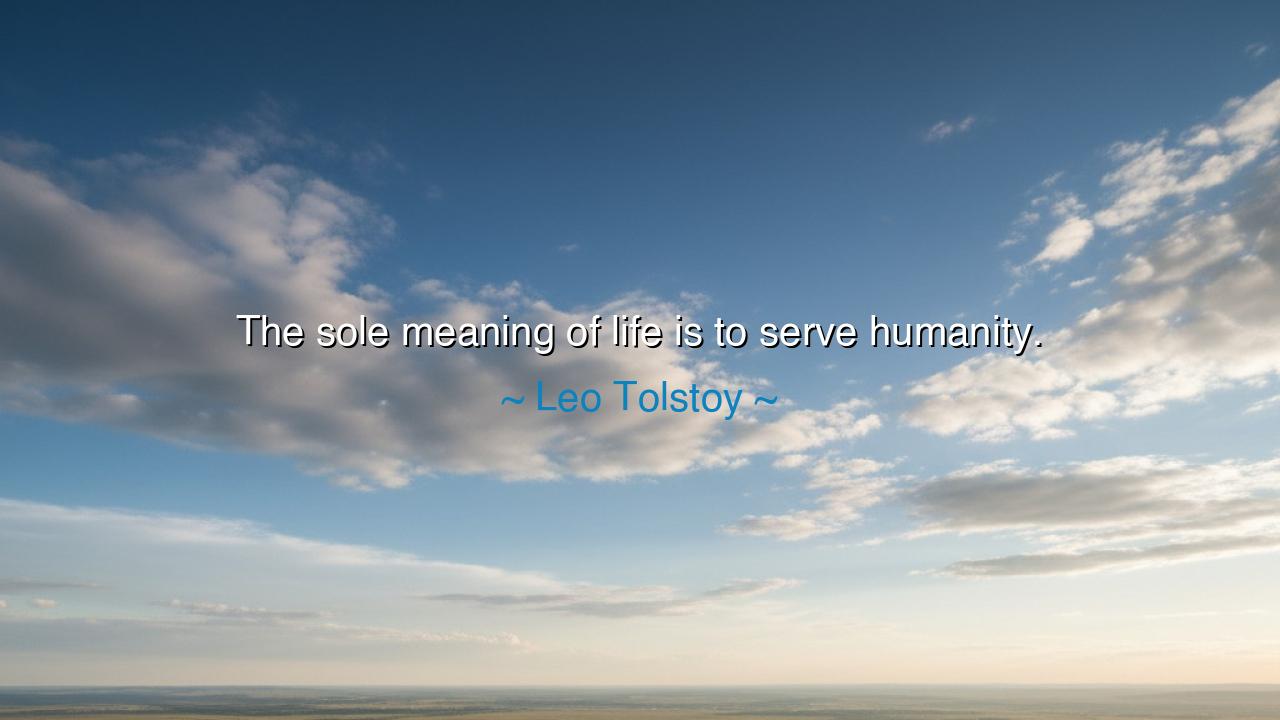
The sole meaning of life is to serve humanity.






Leo Tolstoy, prophet of the Russian soul and seeker of eternal truths, once declared with burning conviction: “The sole meaning of life is to serve humanity.” These words, born from the depths of his later years, were not the idle musings of a novelist but the distilled wisdom of a man who had walked through privilege, fame, despair, and spiritual rebirth. Having tasted the hollowness of wealth and the emptiness of worldly triumph, Tolstoy came to see that the only purpose that endures is to give oneself for the good of others.
The meaning of this teaching is luminous: life finds its significance not in self-indulgence, not in conquest, not in fleeting pleasures, but in service. To serve humanity is to transcend the narrow walls of the self and join in the greater story of mankind. Service may take many forms—feeding the hungry, teaching the ignorant, comforting the sorrowful, or working with one’s hands to build and sustain communities. What binds them all together is love made visible through action. Without such service, Tolstoy believed, life is but an echo that fades swiftly into silence.
The origin of these words lies in Tolstoy’s own crisis of meaning. In the midst of wealth and fame after writing War and Peace and Anna Karenina, he fell into despair, asking whether life itself was worth living. He sought answers in philosophy, science, and reason, but found none. It was only when he turned to the simplicity of the peasantry—who labored, shared, and gave for one another—that he found peace. Their humble service embodied the truth that had eluded him: meaning is not discovered in grand abstractions, but in the everyday act of living for others.
History gives us radiant examples of this principle. Consider the life of Mother Teresa, who abandoned comfort to serve the dying and destitute of Calcutta. She had no throne, no armies, no treasures. Yet her service gave her life immeasurable meaning, and her name is honored across the earth. In her, we see Tolstoy’s wisdom embodied: that the highest calling of man is not to rule or to amass, but to serve.
The absence of such service, on the other hand, breeds misery. History is filled with emperors and kings who sought only themselves—building palaces, hoarding wealth, silencing dissent—yet they died restless, their legacies consumed by hatred. Their lives, though full in appearance, were hollow in truth. For without service, life collapses into vanity.
O children of tomorrow, hear this teaching well: to serve is not to be diminished, but to be exalted. When you feed the hungry, you partake in the banquet of humanity. When you lift the fallen, you rise yourself. When you give without counting the cost, you touch eternity. Service is not the loss of self, but the finding of it—the discovery that your worth is magnified when it is poured out in love for others.
The lesson is clear: if you would live a life of meaning, dedicate yourself to service. Begin not in distant lands, but with those around you: a kind word to the weary, a hand to the struggling, a listening ear to the lonely. Let your talents and resources flow outward, not inward, for only in this way will your days carry the weight of purpose.
Thus let Tolstoy’s words ring in your heart: “The sole meaning of life is to serve humanity.” Walk this path, and you will find that your life is not wasted on vanity but built upon eternal foundations. For in service you join the great river of humanity, and in serving others, you serve the truth itself.






AAdministratorAdministrator
Welcome, honored guests. Please leave a comment, we will respond soon